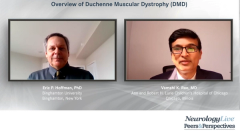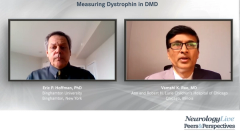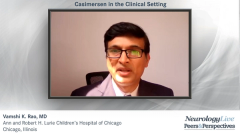
Future of Treating DMD
Final thoughts from leading experts on the future of treating Duchenne muscular dystrophy and keeping standard of care in the forefront.
Episodes in this series

Vamshi K. Rao, MD: As we embark on further research and therapies, the wonderful and positive message is that there are a lot of players involved. There are a lot of people thinking about this and dedicating an enormous amount of time. It is very heartfelt in everybody who I have met in the field, whether it be a great scientific mind like yourself, researchers who are in the trenches, or patient foundations. We could spend a lot of time discussing all that’s out there in different phases of development. But it would be fair to say that there are multiple angles, it’s a variable condition, it’s progressive, and we have to approach therapeutics with a lot of thought, without neglecting standard of care in the interim.
As people who care for these patients and think about the mechanisms of their disease, we have to constantly keep standard of care at the forefront so we can at least use what we have at this time—you alluded to steroids. We need to make sure we are keeping the child ready for whatever comes along so we can take them to a better place in their natural history, all the while diverging from what we know about natural history from our experience. I want our viewers know that there are ongoing treatment trials and drugs that are approved, but standard of care needs to continue. Dr Hoffman, as we conclude our session, what would you like to add to that?
Eric P. Hoffman, PhD: That’s a terrific summary. I’d like to add this sense of optimism, too. Ten years ago, there were no clinical trials for Duchenne muscular dystrophy. Today, there are about 60 trials listed on clinicaltrials.gov. As you pointed out, the field of trying therapeutics in Duchenne muscular dystrophy has exponentially expanded, and that can only be viewed as very positive. But with that, participating in trials is so important. It’s a tremendous burden on patients and families, but we know and are so appreciative of the efforts of families, physicians, and sites, such as yours, that participate in clinical trials. Keeping that going will hopefully lead to effective therapies. That’s the only way to get there. It’s a really promising time. It’s a challenging disease, but I completely agree that the standard of care and keeping families engaged, hopefully in clinical trials as well, is critical to the future successes.
Vamshi K. Rao, MD: Thank you so much, Dr Hoffman. Your expertise and thoughtful way of approaching things is very helpful to this community. I thank all of you for watching this NeurologyLive® Peers & Perspectives®. If you enjoyed the content, please subscribe to our newsletters to receive upcoming programs and other great content in your inbox. Thank you.
Transcript Edited for Clarity
Newsletter
Keep your finger on the pulse of neurology—subscribe to NeurologyLive for expert interviews, new data, and breakthrough treatment updates.




















